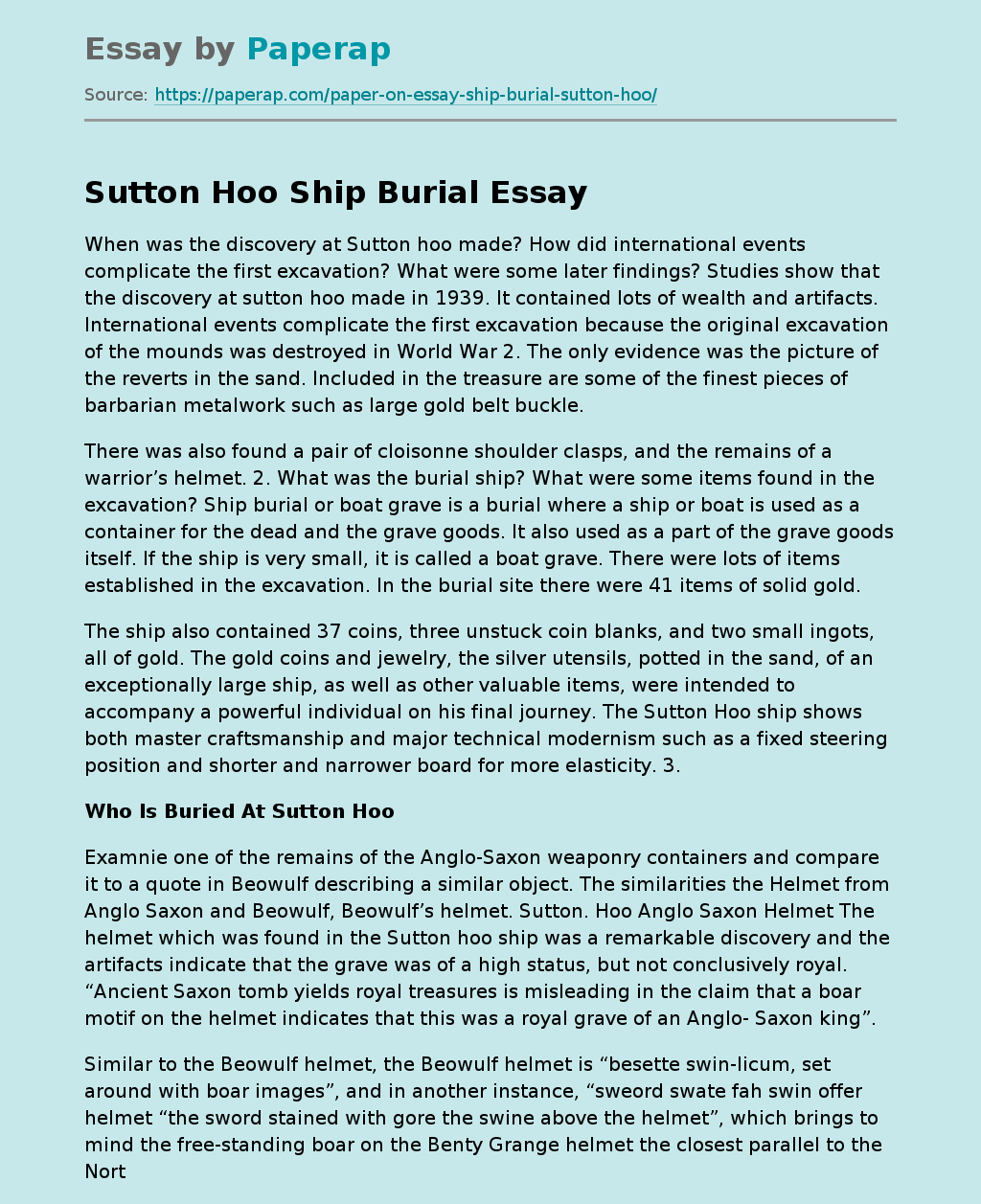Sutton Hoo Ship Burial
When was the discovery at Sutton hoo made? How did international events complicate the first excavation? What were some later findings? Studies show that the discovery at sutton hoo made in 1939. It contained lots of wealth and artifacts. International events complicate the first excavation because the original excavation of the mounds was destroyed in World War 2. The only evidence was the picture of the reverts in the sand. Included in the treasure are some of the finest pieces of barbarian metalwork such as large gold belt buckle.
There was also found a pair of cloisonne shoulder clasps, and the remains of a warrior’s helmet. 2. What was the burial ship? What were some items found in the excavation? Ship burial or boat grave is a burial where a ship or boat is used as a container for the dead and the grave goods. It also used as a part of the grave goods itself. If the ship is very small, it is called a boat grave.
There were lots of items established in the excavation. In the burial site there were 41 items of solid gold.
The ship also contained 37 coins, three unstuck coin blanks, and two small ingots, all of gold. The gold coins and jewelry, the silver utensils, potted in the sand, of an exceptionally large ship, as well as other valuable items, were intended to accompany a powerful individual on his final journey. The Sutton Hoo ship shows both master craftsmanship and major technical modernism such as a fixed steering position and shorter and narrower board for more elasticity.
3.
Who Is Buried At Sutton Hoo
Examnie one of the remains of the Anglo-Saxon weaponry containers and compare it to a quote in Beowulf describing a similar object. The similarities the Helmet from Anglo Saxon and Beowulf, Beowulf’s helmet. Sutton. Hoo Anglo Saxon Helmet The helmet which was found in the Sutton hoo ship was a remarkable discovery and the artifacts indicate that the grave was of a high status, but not conclusively royal. “Ancient Saxon tomb yields royal treasures is misleading in the claim that a boar motif on the helmet indicates that this was a royal grave of an Anglo- Saxon king”.
Similar to the Beowulf helmet, the Beowulf helmet is “besette swin-licum, set around with boar images”, and in another instance, “sweord swate fah swin offer helmet “the sword stained with gore the swine above the helmet”, which brings to mind the free-standing boar on the Benty Grange helmet the closest parallel to the Northamptonshire find. ” The quotes of the is written, The Independent. London (UK): May 2, 1997. pg. 21 4How does the discovery at sutton hoo confirm the Anglo-Saxon culture’s mixture of paganism and Christianity?
The discoveries at Sutton Hoo confirm the Anglo-Saxon cultures. It was important for the expansion of our knowledge and awareness of the magnificent art and culture. For the first time, we can see Anglo-Saxon art and material culture on the royal level. Sutton Hoo confirms an interesting mixture of Christian and pagan traditions that have done much to shed light on passages from Anglo-Saxon poetry dealing with the burial process. Episodes in poems such as Beowulf now have solid, archaeological evidence to add creditability to the often strange blend of customs presented in the text.
Sutton Hoo Ship Burial. (2019, Dec 05). Retrieved from https://paperap.com/paper-on-essay-ship-burial-sutton-hoo/

